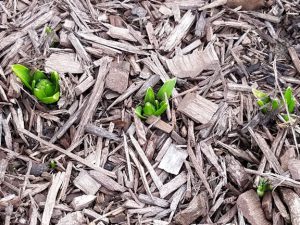Although this winter has been relatively mild, with much more rain than snow, all of those dark and gloomy days have given me a bad case of the seasonal blahs. I haven’t felt like blogging and, more generally, haven’t found much creative inspiration anywhere.
Yesterday I caught myself wondering if my creative energy might have vanished forever, leaving me doomed to a small, diminished, unimaginative life. I told myself that was completely ridiculous; but even after that, I couldn’t manage to get my thoughts onto a more positive track.
At that point, I decided it was high time for a visualization exercise—specifically, asking my 119-year-old future self, Fannie, what she (we) had done to banish those doldrums. Picturing a version of myself so far in the future often helps to improve my perspective, given the fact that whatever situation I’m bothered about in the present is highly unlikely to still exist after so many years.
I found Fannie outdoors on a sunny spring day, walking with her robot poodle on a sidewalk in a well-maintained townhouse complex. A light breeze was blowing, and the air smelled of apple blossoms and freshly cut grass. Somewhere close by, an electric lawn tractor purred softly. Daffodils in bloom gave the sidewalk a bright, cheery yellow border.
(Creative Commons image via flickr)
The imaginary scenery was enough in itself to lift my spirits, especially when a flying car backed out of a garage and took off into a gloriously blue sky with just a few pale clouds. I stood watching it for a moment before I told Fannie about my writer’s block worries, which by now had started to sound even sillier.
Fannie listened with a sympathetic smile as I rambled on while walking next to her. After a while, she gave me her advice. “Just open the window.”
Because we were outdoors and I didn’t know what window she might mean, I felt confused for a moment before she went on to explain further.
“Creative energy is part of the flow of life. When we let ourselves get disconnected from the natural world—such as by being cooped up inside all winter—that flow stagnates. When I feel low on energy, taking a walk usually puts me in a better frame of mind. But sometimes I’ve found it is enough just to open the window for a few minutes, breathe in some fresh air, and tell that stagnant energy it is free to go on its way now.”
Fannie paused to glance up into a flowering tree where a robin was singing, almost invisible behind a thick curtain of white blossoms.
“If you’re looking for inspiration,” she finished, “don’t sit around the house ruminating about why it hasn’t struck you yet. Go out for a walk—and chances are, you’ll find it shows up quite naturally.”









